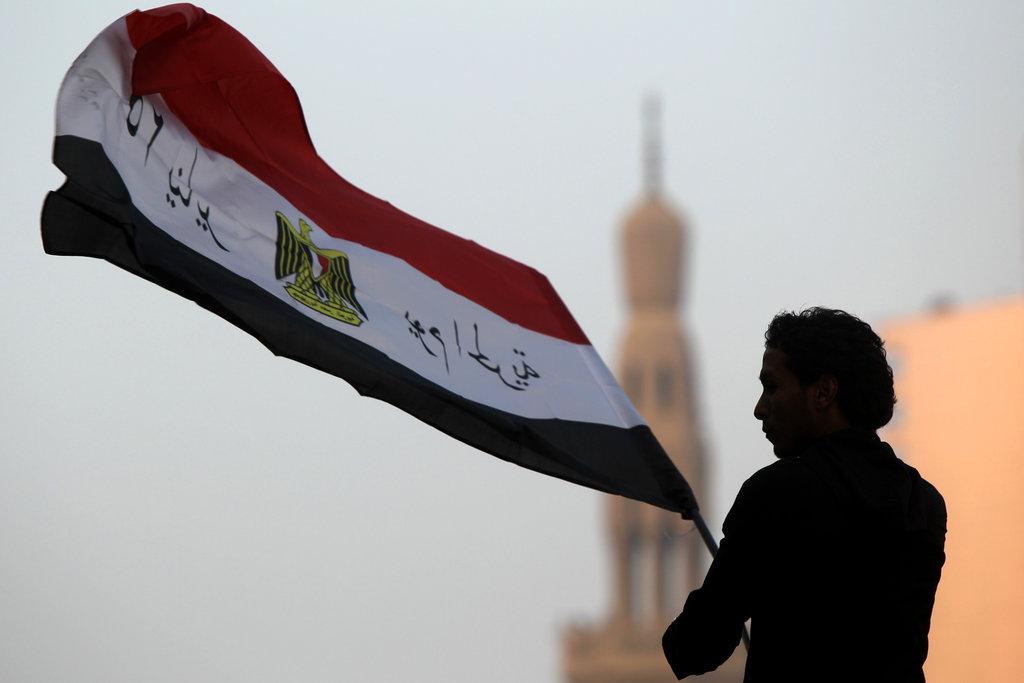Arab Spring dominates Clinton Global Initiative summit
An Egyptian youth waves the national flag with a slogan that reads ’25th of January, Day of the Freedom’ following morning prayers in Tahrir Square, the scene of mass demonstration which brought down the regime of former president Hosni Mubarak.
The author of this post, Juliana Schatz, is a fellow in the upcoming Open Hands Initiative / GlobalPost 'Covering a Revolution' Fellowship. A graduate of the Columbia University Graduate School of Journalism, she will join 16 other journalists from Egypt and the U.S. next month in Cairo to examine the process of building a new democracy.
NEW YORK — With the United Nations General Assembly and the Clinton Global Initiative both meeting this past week, New York City seemed to pulse more than usual, asserting itself as the epicenter for global dialogue.
Dueling protests rallied for and against the idea of a Palestinian member state outside the UN, but across town a more hopeful enthusiasm dominated the Clinton Global Initiative, where the Arab Spring was on the tips of many tongues.
Famed social justice advocates Desmond Tutu and Aung San Suu Kyi discussed Egypt’s ongoing transformation with camaraderie, the revolution evoking a common spirit that characterized their own respective rebellions.
Somali feminist Hibaaq Osman was recognized for her commitment to women’s rights. Her organization Karama, based in Cairo, is very busy building on the hope women in the region now have for increased civil liberties. Of the women she joined in Tahrir Square during the revolution she said, “they have no intention of going back to their homes.”
In that same light, former President Bill Clinton hosted a constructive session where members addressed the biggest challenges facing post-Mubarak Egypt.
The biggest takeaway? The urgency of providing economic dignity to the highly educated and exceedingly underemployed “youth bulge.”
Nearly a third of young people under the age of 30 remain unemployed in Egypt. (Clinton, in a brief aside, remarked, “It’s just about that here in America.”)
Other panelists stressed the importance of listening to the youth, but it was Saad Eddin Ibrahim, a controversial activist who proudly mentioned his imprisonment under Mubarak, who put his finger on the reason for such urgency.
“The Arab Spring, glorious as it was,” said Ibrahim, “is in danger of being hijacked.”
His referral to the well-entrenched Muslim Brotherhood — favored to win power in the November elections — was candid, as was the follow-up by Coca-Cola CEO Muhtar Kent. Kent recognized that if the youth were not empowered economically, their dynamism could become disenfranchised and destructive.
He pled with his private sector comrades:
“Companies generally hold back when there is mist in the air, but business has a role to step up investment,” said Kent. “We know a lasting democracy is not going to come easily. It needs institutions, a free press, a balance of power. These are only going to come with a middle class."
I listened attentively to the panelists’ messages, crammed on the floor with several dozen others in our press-sanctioned corner. It was a primer, so to speak. The real education will come next month, on the ground, in Egypt.
The story you just read is accessible and free to all because thousands of listeners and readers contribute to our nonprofit newsroom. We go deep to bring you the human-centered international reporting that you know you can trust. To do this work and to do it well, we rely on the support of our listeners. If you appreciated our coverage this year, if there was a story that made you pause or a song that moved you, would you consider making a gift to sustain our work through 2024 and beyond?
